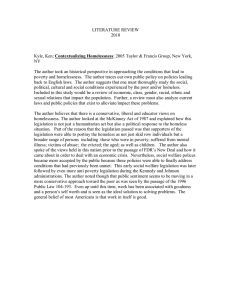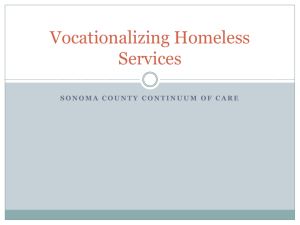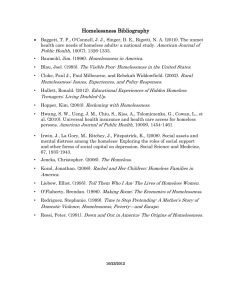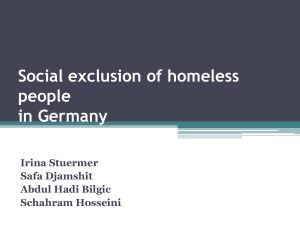Homelessness in 2010 Public Forum Charlotte Mayor Anthony Foxx January 15, 2010
advertisement
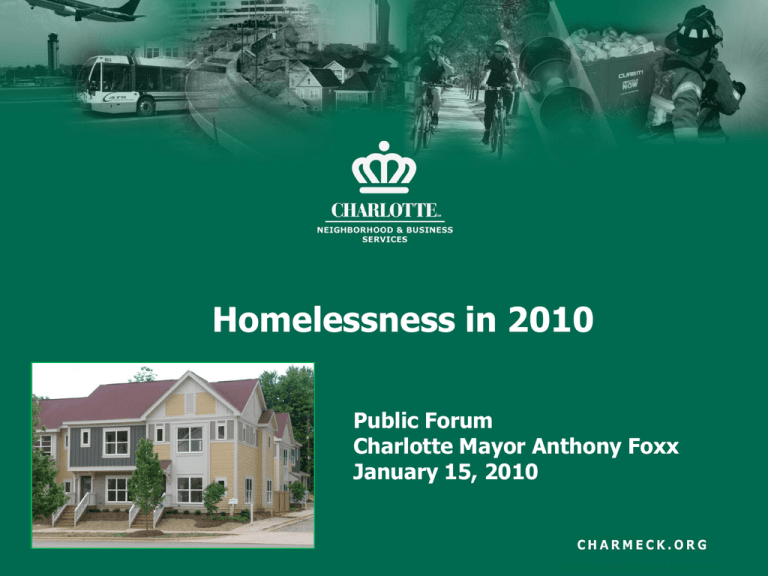
Homelessness in 2010 Public Forum Charlotte Mayor Anthony Foxx January 15, 2010 Homelessness in Charlotte Homelessness… A Growing, Yet Hidden Problem in Mecklenburg County • Approx. 8,000 homeless nightly • Shelters overwhelmed • Approx. 3,000 homeless children • City’s Role - Policy-Maker - Funder - Convener City Initiatives • Charlotte-Mecklenburg’s 10-Year Plan to End and Prevent Homelessness - Adopted by City Council November 12, 2007 - Adopted by County April 17, 2007 - Includes housing providers, City and County • Homeless Prevention and Rapid Re-Housing - Federal Stimulus Funds • Housing Trust Fund - Special Needs Housing • Locational Policy 10-Year Plan to End and Prevent Homelessness Implementation Goals: • Housing - Provide homeless families and individuals safe permanent housing as soon as possible • Outreach and Engagement - Link chronic homeless to housing, treatment and services though intensive outreach and engagement • Prevention - Promote housing stability to prevent families and individuals most at-risk of becoming homeless 10-Year Plan to End and Prevent Homelessness Status: • Implementation structure not yet developed • Projects realized, but not initiated, through plan - McCreesh Place - Emergency Winter Shelter - YWCA Families Together • The Lee Institute is assisting with strategic implementation of the 10-Year Plan - Reviewing and assessing 10-Year Plan - Exploring concept for developing implementation structure - Examining impact of implementation on current housing initiatives Homeless Prevention & Rapid Re-Housing • Program serves households currently homeless or at risk of becoming homeless - Community-based support services; - Temporary financial assistance; and - Life skill training • Intent is to serve persons who can remain housed after temporary assistance ends • Services delivered through non-profit housing support agencies $1.9m in stimulus funds What is Affordable Housing? • Affordable Housing - City’s role has historically not focused on homelessness - Target market has been housing affordable to those who make between 30-60% of the Area Median Income (AMI) • Special Needs Housing - Housing to serve the disabled, homeless, elderly and HIV/AIDs populations earning 60% or less than the AMI • Section 8 - Administered through Charlotte Housing Authority - Federal vouchers distributed to tenants earning 30% or less of AMI to use for market-rate housing Housing Trust Fund • Established by Council in 2001 to provide gap financing for affordable housing - Seven-member oversight advisory board - Council requested priority be given to projects serving 30% or less of AMI • Fund has received $67.3 million in funding since inception - Bonds issued through City’s general fund • Financed 4,067 affordable rental, special needs and ownership housing units - Completed to date: 2,851 new housing units • Funds Committed/Spent - $64 million - Leveraged Development of $399 million (City leverage goal is 1:5) Locational Policy • Policy establishes prohibited, permissible and priority areas for the development of new multi-family rental housing that receive public funds for households earning 60% or less of AMI • Created to: - Avoid undue concentration of multi-family assisted housing; - Disperse geographically new multi-family housing developments; - Support the City's neighborhood revitalization efforts; - Promote diversity and vitality of neighborhoods; and - Support school development, transit corridor development and other public development initiatives Summary • There is an unmet need - Need to address need for approx. 17,000 affordable housing units by 2012 • Issue requires collective support, comprehensive strategy and implementation plan - Continue to convene the community - Implement 10-Year Plan to End and Prevent Homelessness • Policy and funding must reflect the need - Locational Policy review - Funding for supportive services to improve the stability of residents in affordable housing must be aligned with capital investments
